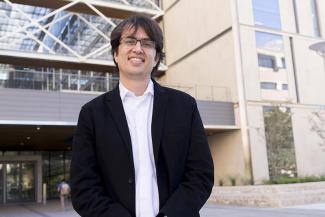
David Soloveichik of Texas ECE has been named a 2023 Schmidt Science Polymath.
The Polymath Program is designed to push the boundaries of scientific and disciplinary limits by promoting the exploration of fresh methodologies and approaches in STEM to unlock breakthroughs and expedite progress in scientific discoveries. In receiving this award, the cohort receives support as they boldly transition from their established fields and enter into new disciplines or methodologies, bringing with them their expertise to conduct pioneering research. Through this model, the Polymaths’ work plays a vital role in advancing knowledge, fostering innovation, and exploring emerging technologies to test unconventional theories.
Support for each Polymath comes at a moment in their careers when scientists have the most freedom to explore new ideas, use emerging technologies and pursue novel scientific and interdisciplinary research in areas that are otherwise unlikely to receive funding.
“We have the potential to accelerate our rate of scientific discovery, and break the pattern of decline in truly disruptive research over time.” said Eric Schmidt, co-founder with his wife Wendy of Schmidt Futures and former CEO and Chairman of Google. “However, this requires support for high-risk, high-reward projects that could advance our efforts to address climate change, fight disease, and unlock the mysteries of our universe. We are honored to announce the 2023 cohort of the Schmidt Science Polymath Program. Their relentless pursuit of knowledge will push the boundaries of scientific exploration and drive transformational breakthroughs, paving the way for a brighter future for all.”
Accomplished professors from over 58 universities submitted applications outlining research ideas in STEM fields that represent a substantive shift from their current portfolio. This new cohort will be joining twelve current Polymaths whose ideas range from the artificial creation of complex soft matter like human tissue to the development of synthetic biology platforms for engineering multicellular systems, to the discovery of exotic forms of quantum matter. The impact of this type of interdisciplinary research could result in innovations previously thought impossible like a 3D printer for human organs, climate change-resistant crops, or the unknown applications of quantum matter.
"We are pleased to bring together a group of determined researchers, each pursuing new research directions to tackle pressing global challenges," said Stuart Feldman, Chief Scientist of Schmidt Futures. "From improving brain imaging and addressing gender bias in medical research, to developing sustainable construction materials and advancing regenerative agriculture, these Polymaths' interdisciplinary work is poised to drive transformative advancements in diverse fields. They will join forces with the current twelve Polymaths, creating a dynamic community of scholars driven by intellectual curiosity and the shared goal of addressing some of the world's most pressing problems with fresh perspectives and bold ideas."
Each awardee will receive $500,000 a year, paid through their institutions, for up to five years, to help support their research. The 2023 awardees join a network of twelve existing Schmidt Science Polymaths.
David Soloveichik is an Associate Professor and holds the Temple Foundation Endowed Faculty Fellowship No.4 in the Chandra Family Department of Electrical & Computer Engineering at The University of Texas at Austin. Prior to joining Texas ECE, Dr. Soloveichik was a Fellow at the Center for Systems and Synthetic Biology at the University of California, San Francisco. He received his undergraduate and Masters degree from Harvard University in Computer Science. He completed his PhD degree in Computation and Neural Systems at the California Institute of Technology, where his dissertation was awarded the Milton and Francis Clauser Doctoral Prize for the best doctoral thesis. His scientific area of interest is Molecular Programming: the engineering of complex molecular systems for synthetic biology, nanotechnology, and bioengineering. He is also studying underlying theoretical connections between distributed computing and molecular information processing. Dr. Soloveichik was the recipient of the Feynman Prize in Nanotechnology (Theory) from the Foresight Institute in 2012, and the Tulip Award from the International Society for Nanoscale Science, Computation and Engineering in 2014.
